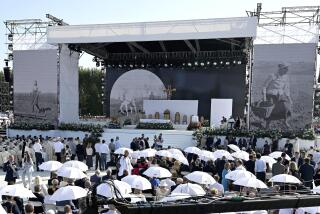Pope Beatifies WWII Croat Nationalist
- Share via
MARIJA BISTRICA, Croatia — In one of the most controversial blessings of his reign, Pope John Paul II on Saturday elevated toward sainthood a Croatian nationalist who was an anti-Communist martyr to Roman Catholics but a wartime Nazi collaborator to many Serbs and Jews.
“An illustrious son of this blessed land is raised to the glory of the altars,” John Paul declared as he beatified Cardinal Aloysius Stepinac before 400,000 cheering Croatian worshipers.
“One of the outstanding figures of the Catholic Church, having endured in his own body and his own spirit the atrocities of the Communist system, is now entrusted to the memory of his fellow countrymen with the radiant badge of martyrdom,” the pope added.
The solemn ceremony, which brought Stepinac to within one official step of sainthood, was a provocative act in favor of one of the Balkans’ most divisive figures of this century.
The anti-Communist pope, on a three-day visit to Croatia, also appealed for “forgiveness and reconciliation” among the region’s recently warring peoples.
Stepinac, who died under house arrest by Yugoslavia’s Communist rulers in 1960, was a fierce advocate of Croatian nationalist aspirations that led, three decades later, to Yugoslavia’s breakup and to predominantly Catholic Croatia’s independence.
So fervent was his opposition to the Serb-dominated Yugoslavia of the 1930s that he welcomed the self-styled Independent State of Croatia, a puppet fascist regime established by the conquering Italians and Germans who occupied Croatia and parts of Bosnia and Serbia from 1941 to 1945.
For many, Stepinac was a symbol of that regime, which slaughtered tens of thousands of Serbs, Jews, Gypsies and other targets of persecution. As archbishop of Zagreb, the capital, he blessed fascist Croatian soldiers and said Masses for the regime’s leader, Ante Pavelic.
Yugoslav dictator Marshal Josip Broz Tito had Stepinac arrested and convicted of treason a year after the war.
After serving five years of a 16-year sentence of hard labor, Stepinac was released to house arrest in 1951. He was made a cardinal two years later--a recognition of his struggle to save Croatia’s Catholic identity under communism.
John Paul said Saturday that Stepinac’s death, at age 62, “was caused by the long suffering he endured.”
Stepinac’s story, he added, “sums up the whole tragedy that befell the Croatian people [in] this century marked by the three great evils of fascism, national socialism and communism.”
In his strongest defense of the cardinal’s war record, the pope quoted Stepinac as speaking out in 1943 against the killing of innocents and declaring that the only system the church supports is “the Ten Commandments of God.”
To the cardinal’s critics, however, 1943 was quite late. While recognizing that he intervened quietly to save several hundred lives, Jewish leaders in Croatia fault Stepinac for waiting nearly two years to speak out publicly against the regime’s death camps.
Stepinac is also accused of carrying out the regime’s orders to convert Orthodox Serbs and Jews to Catholicism against their will. His defenders say the only order he gave priests was to oblige the many who were asking to become Catholics in order to save their lives.
“He wasn’t a criminal, but he wasn’t a saint either,” said Slavko Goldstein, a senior member of Croatia’s Jewish community. “Eventually, he stood up against some aspects of the system--its racial policies, the camps--but he never said, as he said against communism, that the system was evil.”
Croatia’s Jews recently issued a statement of gratitude for the lives Stepinac saved and said they “will not object” to the beatification.
But they added: “History will be the one to judge Cardinal Stepinac’s overall stance” toward the regime.
The Los Angeles-based Simon Wiesenthal Center, an international Jewish human rights group, urged postponement of the ceremony until independent scholars could study Stepinac’s record in the Vatican’s still-secret World War II archives. The Vatican ignored the request.
John Paul “is aware of the accusations, but after a scrupulous inquiry, he’s convinced that this man was a great defender of human dignity,” Father Tim Dolan, a church historian, said in Rome. “He knows it might be politically incorrect to do this, but he’s not going to be held hostage to conventional wisdom.”
Serbs, who make up 12% of the population in Croatia, judged the beatification more harshly but issued no collective condemnation.
“It evokes ghosts for us, when our people were persecuted for ethnic reasons,” Vlastimir, a retired Serbian factory worker in Zagreb who would not give his last name, said in a typical comment.
Milorad Ekmecic, a history professor at Belgrade University in Yugoslavia, said “making a saint out of a man who was responsible for massacres will have a grave effect” on tensions in the Balkans, where Serbs and Croats forged an uneasy peace after their 1992-95 war in Bosnia-Herzegovina.
The crowd at the beatification spilled from an outdoor amphitheater built for the occasion and spread up the surrounding mist-covered hills 30 miles outside Zagreb.
More to Read
Sign up for Essential California
The most important California stories and recommendations in your inbox every morning.
You may occasionally receive promotional content from the Los Angeles Times.













